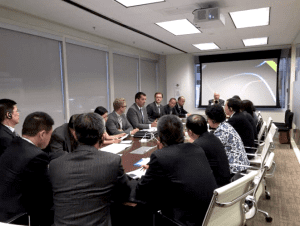 ICLEI – Local Governments for Sustainability, USA (ICLEI USA) hosted a delegation of environmental protection and municipal government officials from China’s Ministry of Environmental Protection, Jiangsu Provincial Environmental Protection Department, and environmental protection officials from Nanjing, Wuxi, Changzhou, and Suzhou as part of its ongoing activities under the California-China Urban Climate Collaborative (CCUCC). The CCUCC fosters long-term collaboration amongst Californian and Chinese cities to join together to be more effective and powerful—in combating carbon emissions and air pollution.
ICLEI – Local Governments for Sustainability, USA (ICLEI USA) hosted a delegation of environmental protection and municipal government officials from China’s Ministry of Environmental Protection, Jiangsu Provincial Environmental Protection Department, and environmental protection officials from Nanjing, Wuxi, Changzhou, and Suzhou as part of its ongoing activities under the California-China Urban Climate Collaborative (CCUCC). The CCUCC fosters long-term collaboration amongst Californian and Chinese cities to join together to be more effective and powerful—in combating carbon emissions and air pollution.
Michael Schmitz, Executive Director of ICLEI USA, welcomed the delegation to California and presented on the progresses made, challenges yet to overcome, and opportunities for collaboration on climate action and air pollution reduction. “By today’s standard, we have made tremendous improvement,” stated Mr. Schmitz, citing examples from California and New York. Since the late 1980s, California PM2.5 levels have dropped approximately 70% and NOx emissions from stationary sources have declined 68% due to state legislation, clear regulatory milestones that provide business certainty, and strong support for science-based and cost effective technology solutions. At the same time California’s population more than doubled and GDP has increased five-fold. We can growth our economy and protect our environment at the same time,” stated Mr. Schmitz.
Improvements have been made, but challenges remain pressing. Trans boundary air pollution requires vigorous and regional prevention and mitigation strategies. The changing climate with increasing number of hotter days traps more pollution, reduces atmospheric mixing, and causes more ozone and smog formation. While we celebrate economic improvements, the related increased resource demand and energy consumption results in more pollution. The group agreed on the importance of acting now and acting together.
Mr. Chen Zhipeng, Vice Director of Jiangsu Provincial Environmental Protection Department, welcomed the collaborative opportunity. He highlighted the key air pollution reduction challenges that his province faces, including severe winter smog due to increased coal consumption for heating, increasing complexity in managing secondary pollutants such as PM2.5 and O3 that are formed from primary pollutants, and balancing economic development and air pollution reduction. “We are California ten or twenty years ago or even the smog-shrouded California in 1970s,” compared Mr. Chen. “We hope to borrow your advanced technology, innovative environmental protection concepts and experience in order to leapfrog past mistakes to reach where you are today.”
The group exchanged air pollution prevention and control measures including examples presented by Oakland’s Sustainability Program Manager Daniel Hamilton promoting cleaner fuel, phasing out energy-inefficient and emission-intensive vehicles and smaller boilers, building higher urban density around transit lines, and enhancing real-time monitoring and communicating air pollution with the general public.
Adam Lenz, Environmental Manager of Richmond, CA, shared air monitoring best practices from the City’s real-time air monitoring program, which allows communities to monitor real time air pollution status, provide the general public access to such data, and in case of emergency informs individuals of the specific atmospheric composition and concentration level of each air pollutant in order to make the necessary protection measures.
The group agreed that different approaches contribute to the resolution of common air quality and environmental challenges and that continued exchange through programs such as ICLEI’s CCUCC provides the convenient platform, shared understanding, and extensive expert network to convene leading cities to join forces and together being more effective and powerful to achieve cleaner air and a healthier environment.